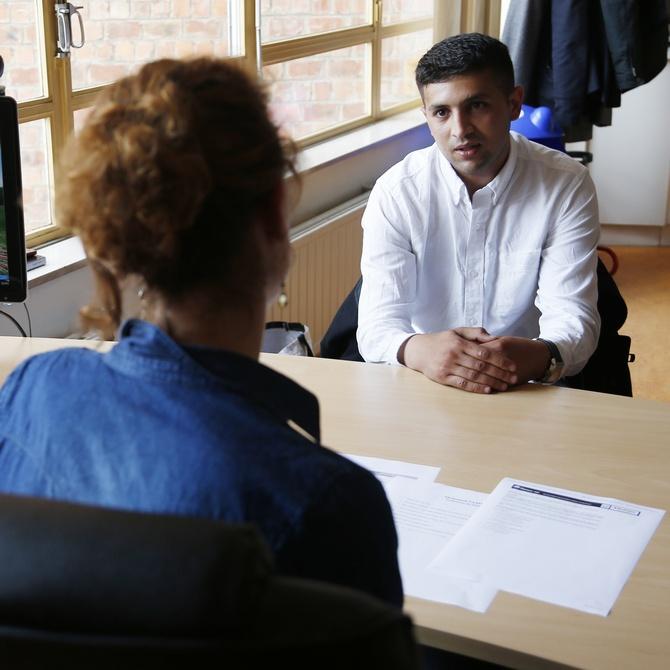Photographs: Francois Lenoir/Reuters Divya Nair
Chetan Mahajan, President, HCL Learning tells you how to respond to these seemingly simple but tricky interview questions.
Read on to know just how to make these questions work for you.
In a job interview, almost every employer will ask you questions like 'Why did you quit your last job?' 'What is your greatest weakness?'
Such seemingly simple questions are often the game changers in an interview.
So how do you ace them? Chetan Mahajan offers you some tips:
Question 1: Tell me something about yourself
- Don't read out from the CV. Highlight only what's relevant.
- Don't elaborate on a single point/area unless you are asked to do so. For example, when you are talking about your family, the employer definitely doesn't need to know where your great grandfather worked unless he did something commendable like winning the Nobel, fighting the World War... and that has inspired you in some way.
- Keep it brief and to the point. Talk about your family, education, professional experience, special skills and your career objective.
- Practice in advance and compile the information in less than two minutes.
- Don't forget to make a mental note of what kind of information interests the employer through the rest of the conversation. This should help you decide what to say and what to avoid.
- Downplay hobbies and interests unless you've achieved something at the national or international level.
Please click NEXT to continue reading...
'Be honest, avoid badmouthing your last employer'
Image: Try to be honest and present a balanced view of things.Photographs: Lucy Nicholson/Reuters
Question 2: Why did you quit your last job?
Although the rule of thumb is to be honest, avoid badmouthing your last employer.
Give a balanced summary of your last job experience -- the good and the bad.
Then end it by saying how you're looking forward to the new role and opportunity.
Question 3: Why did you apply for this job? Why do you think should the company hire you?
- Again, the key is to be honest. Say you are passionate and are looking for a new challenge through the opportunity.
- This is where your research and homework will prove handy. Every organisation expects their prospective hires to come prepared and know a few important things about them.
- Share an example of how a certain initiative or project of the organisation impressed you, or how you aim to work on a certain project the company is planning to undertake.
- Talk about your merits -- your marketing and negotiating skills, how you led your team through a challenging situation etc.
- At the same time, never mention the M word in the first round of the interview. It is understood that you are expecting a better remuneration than what your current organisation is offering. Reserve the discussion for the HR round.
Please click NEXT to continue reading...
'Talk about skills that are relevant to the job profile'
Image: You must be able to demonstrate your skills and achievements.Photographs: Andres Stapff/Reuters
Question 4: Define your strengths and weaknesses.
- When talking about skills, always demonstrate with the right examples.
- Talking about your strengths should be easy, but pick the ones you think will be relevant to the job profile and organisation you applied for. For example, if you have applied for a consultant profile, you must talk about your research and analytic skills.
- When it comes to discussing weaknesses, don't act smart. Bad handwriting, for example, doesn't qualify as a weakness, particularly in this age of the internet. So try to be a little more giving here.
- If you're a Collections guy, you may probably say, you’re not an expert at Microsoft Excel but if given the opportunity, you'd like to sign up for a training programme to improve your skills in it. Even if the company doesn’t have a training programme, they might consider your honesty and eagerness to learn and improve your skills.
Question 5: Will you quit your job after marriage?
- This question is targeted more at single women than men.
- It would be difficult to come up with an honest answer; if your prospective partner lives/moves to a different city or country it may alter your career decision.
- The best answer would be: "I'm a career woman and would like to continue working even after marriage."
Please click NEXT to continue reading...
'Don't sound too anxious when talking'
Image: Confidence and honesty are the keys to crack a job interview.Photographs: Reuters
Some more tips to turn the interview in your favour:
- If you're a fresher, don't be rigid in the first 18 months of your career. Be open to new experiences and take on a completely different job profile. This is your learning phase and you need to get the most out of it. So be flexible.
- Unless you're being interviewed over the phone, make eye contact with the person you are speaking with. If during the conversation you look away because you’re nervous or the employer looks intimidating, you will be giving the impression that you are either not prepared or not sure of taking the opportunity.
- Remember to extend a firm, confident handshake before and at the end of the interview.
- Don't sound too anxious when talking. Pause at the right intervals. Speak loudly and clearly.
- If you are not sure of something, it's okay to say 'I don't know'.
- When the interviewer asks -- Do you have any questions? -- Don't just nod your head and say 'nothing'. Ask at least one relevant question related to the job profile you have applied for. It shows that you are interested in the opportunity.
- Ask non-frivolous questions like: 'Who will I be reporting to?' or 'What is my probable career path going to be in the organisation?'
- Consider the job location and discuss it with your employer before you take it up.
- Be honest about what your priorities are, rather than setting up the wrong expectations and avoid the disappointment of not fulfilling them later.
- Even if you don't make it through the interview, don't forget to send a 'Thank you' note to the hiring manager and stay in touch professionally through LinkedIn or any other career site that you are part of. Networking, a wise man told me, is 'the art of reaching out to people when you don't need them'.





Comment
article